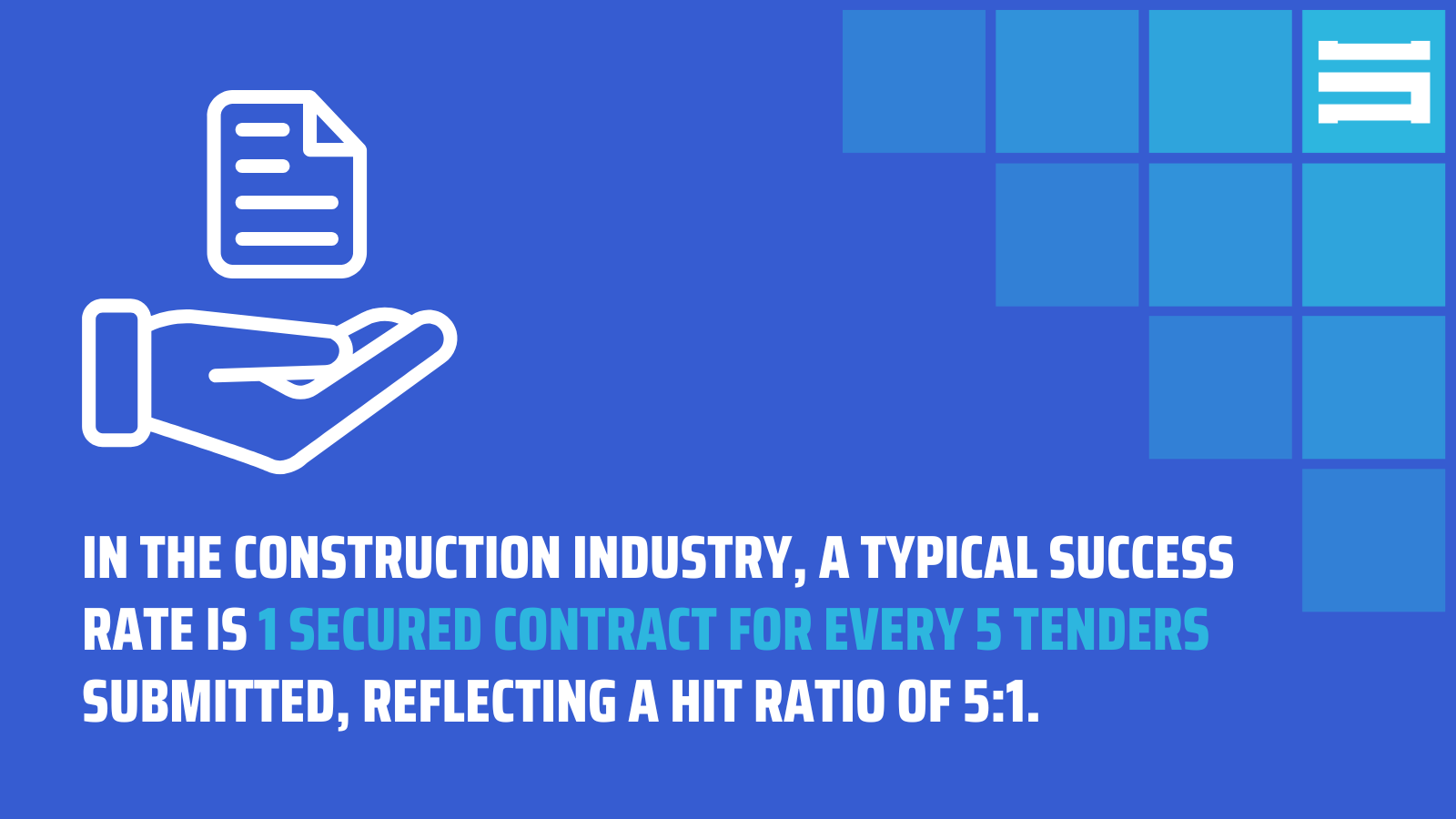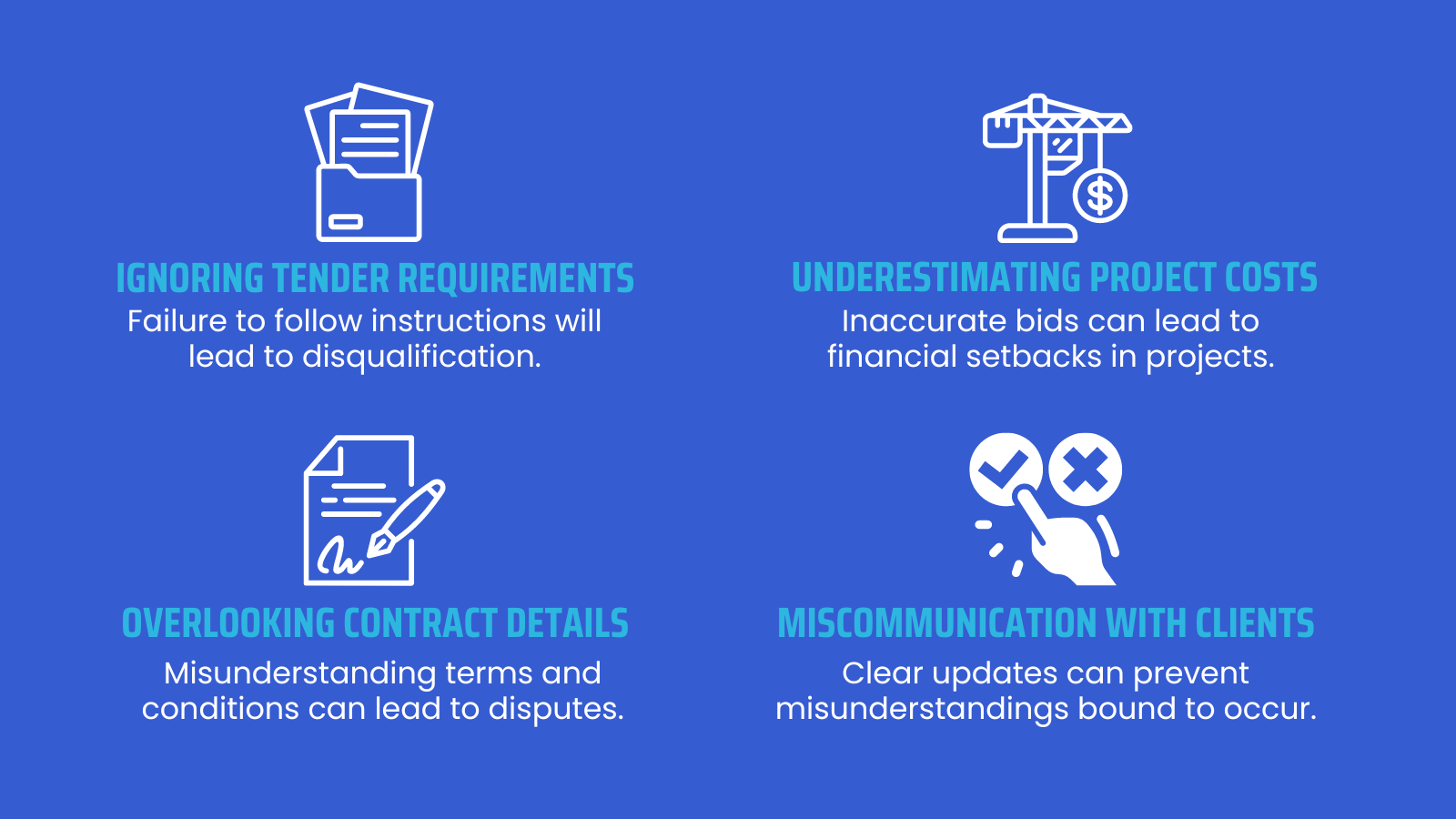The tendering and contract preparation process is the backbone of any successful construction project. It demands not only a comprehensive grasp of various tendering procedures but also eagle-eye attention to documentation and strategic foresight. Every detail, from the initial bid to the final contract, must be carefully curated to ensure that the project is secured on favourable terms and delivered to the highest standards.
This blog dives deep into each stage of the process, shedding light on different tendering methods, key consideration factors, and how effective contract preparation paves the way for project success, mitigating risks and enhancing outcomes.
How Does the Construction Tender Process Work?
Tendering is a structured process where contractors are invited to submit proposals for the execution of specific construction projects. It is designed to ensure transparency, competitiveness, and fairness in the procurement process.
In the construction industry, a standard benchmark is often a hit ratio of 5:1. Essentially, this means that for every five jobs a contractor bids on, they typically secure one contract.

Therefore, to secure and be awarded the submission, there are several steps involved, each requiring attention to detail to ensure that:
Tender Solicitation
The tendering process begins when a project owner issues a request for tenders. This can be in the form of an Invitation to Tender (ITT), Request for Proposal (RFP), or Request for Quotation (RFQ). The aim is to gather bids from qualified contractors interested in undertaking the project. The solicitation document outlines the project's scope, requirements, timelines, and evaluation criteria.
In the UAE, tender solicitation for construction projects often includes additional requirements such as FIDIC tender documents, which are widely used in international construction contracts. It's essential for contractors to be familiar with these documents and the specifics of UAE construction tenders.
Tender Document Preparation
Preparing comprehensive and accurate tender documents is crucial for a successful bid. It typically includes detailed information on project requirements, technical specifications, and contractual obligations. Key elements of a tender document are:
- Bill of Quantities (BOQ): A detailed list of materials, parts, and labour required for the project. Learn more about how an accurate Bill of Quantities can drive efficiency in your construction projects here.
- Scope of Work (SOW): Outlines the work to be performed, including deliverables, timelines, and quality standards.
- Contract Terms and Conditions: Specifies the legal framework governing the agreement between the parties.
- Project Drawings and Specifications: Provide visual and technical details necessary for executing the project.
- Health and Safety Requirements: Include site-specific safety plans and risk assessments. Discover more about health, safety and environmental standards to be implemented in the construction workplace here.
Contractors must also provide evidence of their qualifications, past project experience, financial stability, and the necessary licences to operate in the region. For government tenders, additional documents such as performance bonds and insurance certificates may be required.
Tender Submission
Once the tender document is complete, it is submitted to the project owner within a specified timeframe. Submissions are often required to be in a specific format, and late or incomplete tenders can result in disqualification. In the UAE, electronic submission platforms are increasingly common, streamlining the process and ensuring transparency.
During this phase, contractors should double-check all details, ensure that all required documents are included, and present their proposal in a professional and organised manner. Attention to detail in this phase can significantly influence the perception of the contractor's capability and reliability.
Tender Evaluation and Selection
The project owner evaluates all submitted tenders based on predefined criteria such as price, quality, experience, and compliance with the tender requirements. The evaluation process may involve tender levelling, where all tenders are compared on an equal footing to identify the best offer. This phase can be particularly competitive in the UAE, where both local and international firms vie for high value construction projects.
The selected contractor is usually the one that offers the best value for money, balancing cost, quality, and experience. However, for private company tenders, additional factors such as innovation and technical expertise may also play a significant role in the selection process.
Contract Formation and Finalisation
After the tender is awarded, the next step is to draft and finalise the construction contract. This document formalises the agreement between the project owner and the contractor, outlining the scope of work, payment terms, timelines, and other critical details.
Contractors should ensure that the contract terms align with their understanding of the project requirements and that all potential risks are addressed. This phase may involve negotiation to refine the contract terms, particularly in areas like payment schedules, variation management, and dispute resolution.
Key Considerations in Construction Tender Preparation

Understanding Project Requirements
Contractors must review the project scope, technical specifications, and timelines. This involves a detailed analysis of the project’s objectives, deliverables, and milestones to ensure there are no miscalculations in cost and time. Misunderstanding these elements can lead to significant delays and budget overruns. It’s crucial to ask clarifying questions and seek additional information if any aspect of the project requirements is unclear.
Compliance with Local Regulation
Ensure that all tender documents are in strict compliance with local construction laws, including environmental and safety regulations. This is particularly important in regions like the UAE, where there are stringent guidelines. Non-compliance can result in legal penalties, project delays, or even disqualification from the tendering process. Regularly update your knowledge of local laws and engage with legal experts to ensure full compliance.
Accurate Cost Estimation
A thorough and precise estimation of project costs is essential. This includes labour, materials, equipment, and overheads. Inaccurate cost estimation can lead to financial strain during project execution, potentially causing delays or compromising the quality of work. Utilise cost estimation software and historical data from similar construction projects to enhance accuracy. Include a buffer for unexpected expenses to safeguard against financial risks.
Risk Management
Identify potential risks that could impact the project, such as supply chain disruptions, labour shortages, or unforeseen site conditions. Develop comprehensive contingency plans to address these risks. This proactive approach helps in mitigating the impact of these risks on the project timeline and budget. Regularly review and update your risk management plan as the project progresses.
Subcontractor Coordination
Verify the credentials and experience of any subcontractors involved in the project. Their performance directly impacts the project’s success. Ensure that subcontractors are reliable, have a good track record, and can meet the project’s standards and deadlines. Establish clear communication channels and regular check-ins to monitor their progress and address any issues promptly.
What are the Common Mistakes to Avoid in Preparing Construction Tenders and Contracts?

- Ignoring Tender Requirements
Failing to comply with the specified tender instructions can result in disqualification. Pay close attention to every detail in the tender document, including submission deadlines, required documentation, and specific formatting guidelines. Double-check your submission to ensure all requirements are met. - Underestimating Project Costs
Submitting a low bid to win the project can lead to financial issues and project delays. Ensure that your bid covers all foreseeable costs and contingencies. A realistic and well-calculated bid not only increases your chances of project success but also builds your reputation as a reliable contractor. - Overlooking Contract Details
Do not rush into signing a contract without thoroughly understanding all the terms and conditions. Seek legal advice if necessary to clarify any ambiguous clauses. Understanding the contract fully helps in avoiding disputes and ensures that both parties are clear on their obligations and expectations. It was reported that from 2020 to 2021, the average value of construction disputes declined by 3% across the globe but remains at historically high levels compared to 2019 and earlier. The average time taken to resolve disputes increased significantly, by almost 15%, after steadily declining for three years. - Miscommunication with Clients
Maintain clear and open communication with the client throughout the tendering and contract formation process. This helps in avoiding misunderstandings and ensures that any issues are addressed promptly. Regular updates and transparent communication build trust and for a positive working relationship.
What are the Types of Tendering Methods?
There are several tendering methods used in the construction industry.
- Open Tendering: Open tendering allows any qualified contractor to submit a bid. It is commonly used in public and large-scale projects to encourage competition and transparency. While this method can attract many bids, it may also require a more extensive evaluation process.
- Selective Tendering: In selective tendering, only pre-qualified contractors are invited to submit bids. This method ensures that only capable and experienced contractors are considered, reducing the risk of project delays and quality issues.
- Negotiated Tendering: Negotiated tendering involves direct negotiation between the project owner and a preferred contractor. This method is often used for complex or high-value projects where the owner's priority is to work with a trusted partner.
What are the Key Benefits of Effective Construction Tenders?
Increased Project Success Rate
A well-prepared tender document not only reflects the contractor’s professionalism but also their thorough understanding of project requirements. It provides a detailed plan for execution, showcasing the contractor's ability to deliver quality work within the stipulated time and budget. This comprehensive presentation of capability and readiness increases the chances of being awarded the contract, particularly in competitive markets.
Improved Financial Management
Effective tender preparation includes precise cost estimation and thorough risk assessment. By accurately forecasting expenses related to labour, materials, equipment, and overheads, contractors can better manage their cash flow and allocate resources efficiently. This financial clarity helps in avoiding unexpected costs and ensures the project remains within budget, ultimately safeguarding the contractor’s profitability.
Enhanced Client Relationships
Transparent and detailed tender submissions build a foundation of trust between the contractor and the client. When clients receive well-structured and comprehensive tenders, they are reassured of the contractor’s commitment to transparency and quality. This trust often translates into long-term partnerships, providing opportunities for repeat business and referrals, which are invaluable for sustained growth.
Reduced Dispute Occurrence
Thorough contract preparation involves clearly defining the roles, responsibilities, and expectations of all parties involved. By addressing potential ambiguities and establishing clear terms for project execution, payment schedules, and dispute resolution, contractors can significantly reduce the likelihood of conflicts during the project. This proactive approach to conflict management ensures smoother project progression and a better working relationship with clients.
Streamlined Project Execution
A detailed understanding of the project scope, timeline, and deliverables allows contractors to plan their resources and activities more effectively. This includes scheduling labour, securing materials, and coordinating subcontractors, all of which contribute to efficient project execution. With a well-prepared contract in place, contractors can avoid delays and disruptions, helping the project manager’s ensure that the project is completed on time and to the client’s satisfaction.
Enhanced Competitive Advantage
In a competitive construction market, a well-prepared tender document can set a contractor apart from others. By clearly outlining the unique value propositions, such as innovative methodologies or sustainable practices, contractors can demonstrate their expertise and distinct capabilities. This strategic presentation not only helps in winning bids but also positions the contractor as a preferred partner for future projects.
Better Risk Mitigation
Identifying and planning for potential risks in the tender document demonstrates foresight and preparedness. By outlining contingency plans and strategies to handle unexpected events, such as material shortages or adverse weather conditions, contractors can reassure clients of their ability to manage the project effectively under challenging circumstances. This risk management approach minimises disruptions and enhances the project’s overall resilience.
Optimised Resource Allocation
Effective contract preparation allows contractors to map out the required resources accurately, including manpower, equipment, and materials. This precise allocation ensures that resources are available when needed, preventing bottlenecks and overextension. It also helps in maintaining a steady workflow, reducing idle time and improving overall project efficiency.
Improved Quality Control
Detailed tender and contract preparation include setting clear quality benchmarks and procedures. By defining the standards and processes in advance, contractors can ensure that every phase of the project adheres to these quality requirements. This proactive quality management prevents rework, reduces costs, and enhances client satisfaction by delivering a final product that meets or exceeds expectations.
Greater Flexibility in Negotiations
A well-prepared contract provides a strong foundation for negotiations. Contractors with a clear understanding of their offer, backed by detailed cost and schedule breakdowns, are better positioned to negotiate terms and conditions favourably. This flexibility can lead to mutually beneficial agreements, such as favourable payment terms or project timelines, without compromising on project quality or contractor profitability.
Conclusion
The tendering and contract preparation process is a cornerstone of successful construction projects. From understanding the tendering methods to preparing detailed documents and negotiating contracts, every step requires careful planning and execution. By mastering this process, contractors can increase their chances of securing high-value projects and building lasting relationships with project owners.
About us
Stonehaven is a trusted project management company and construction consultant based in Dubai, offering comprehensive construction management services across the UAE with offices located in Dubai, UK and Sri Lanka. As one of the leading project management companies in Dubai, we manage projects from inception to completion, ensuring quality, efficiency, and cost-effectiveness at every stage.
We deliver value through expert project management consultancy services, tailored to meet the unique needs of each client. Our core services include Cost Management, Project Management, Construction Supervision, Engineering Support, Design Support, and Marketing & Communications. Whether you’re looking for construction consultants or project managers in the UAE and wider GCC region, Stonehaven is your trusted partner for achieving excellence in your next project.
Stonehaven enhances this process by offering specialised tendering and contract preparation services, tailored to roads and infrastructure projects. Our experienced team ensures that all aspects of the tendering process are handled professionally, from initial bid preparation to contract finalisation, guaranteeing that projects are not only secured but also executed to the highest standards.
Contact us today to learn more about our tender document preparation services and how we can support your business in securing and delivering successful construction projects.







